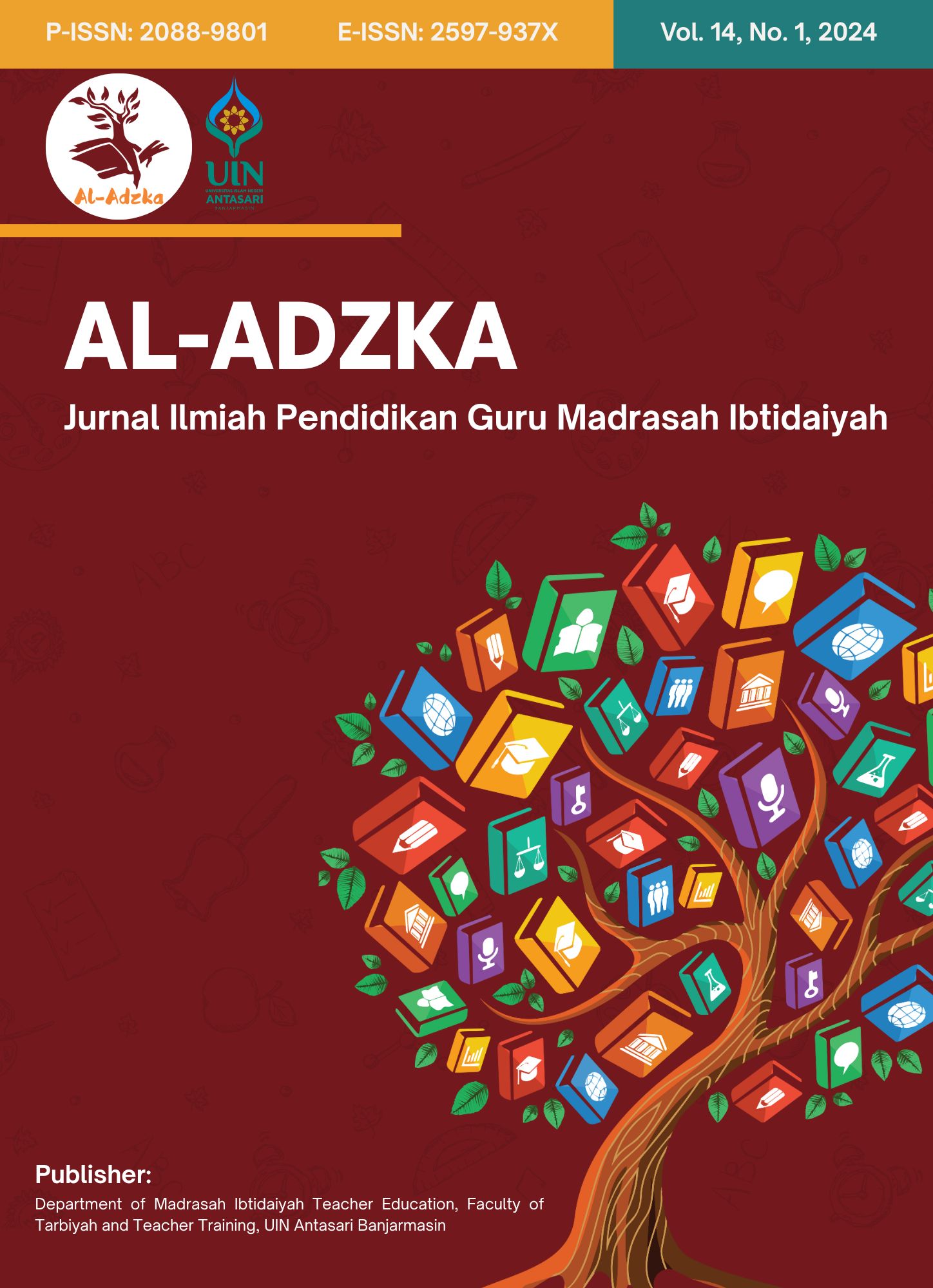Teachers' Performance in Integrating Technology in The Digital Era Through Professional Competence and Self-Efficacy
DOI:
https://doi.org/10.18592/aladzkapgmi.v14i1.11016Keywords:
Self-efficacy;Technology Integration Performance;Technology Professional knowledgeAbstract
This study is to ascertain the impact of teachers in MIN 1 Malang City regarding technology professional knowledge, self-efficacy, and the efficacy of technology integration performance. It also seeks to ascertain the relationship between these variables. This study employs a quantitative methodology within the framework of a descriptive-explanatory research design. Based on teaching experience spanning more than five years, 103 teachers, or 45.5% of the total population, comprise the samples, as determined by the sample calculation using the Slovin formula. A questionnaire with a measurement scale ranging from 1 to 5 was the instrument utilized. Descriptive statistical analysis and structural equation modeling (SEM) were used as data analysis methodologies. Teacher Technology Professional Knowledge, Teacher Self-Efficacy, and Technology Integration Performance of MIN 1 Malang City Teachers meet high criteria with a PPT value of 3.87 (77.4%), EF of 3.54 (70.8%), and KIT of 3.53 (70.6%). The dimension of technology content knowledge, the dimension of confidence for students, and the dimension of ICT confidence have the greatest influence on each variable by providing the highest value on its indicators. There is an influence of technology professional knowledge on technology integration performance in learning through teacher self-efficacy in MIN 1 Malang City. It can be said that the higher the professional knowledge of technology and teacher self-efficacy, the more effective integrating technology is.References
Abbitt, J. T. (2011). Measuring technological pedagogical content knowledge in preservice teacher education. Journal of Research on Technology in Education, 43(4), 281–300. https://doi.org/10.1080/15391523.2011.10782573
Abukishk, A. A., & Alkhasawneh, S. (2020). An investigation of factors influencing physics teachers’ intention to use virtual laboratory at the international schools in Amman. Psychology and Education, 57(5), 295–301.
Ananda, R., Rahma Rani, A., & Tuanku Tambusai, U. (2022). Pengembangan Model TPACK untuk Menunjang Kompetensi Profesional pada Guru Sekolah Dasar. Jurnal Basicedu, 6(5), 9064–9069.
Andyani, H., Setyosari, P., Wiyono, B. B., & Djatmika, E. T. (2020a). Does technological pedagogical content knowledge impact on the use of ICT in pedagogy? International Journal of Emerging Technologies in Learning (iJET), 15(03), 126. https://doi.org/10.3991/ijet.v15i03.11690
Aniah, C. N. F. (2019). Assesing pre-service teachers technological pedagogical content knowledge self-efficacy towards technology integration in colleges of education in south-west Nigeria. Journal of Science, Technology, Mathematics and Education, 15(3), 131–141.
Aslan, A., & Zhu, C. (2017). Investigating variables predicting Turkish pre-service teachers’ integration of ICT into teaching practices. British Journal of Educational Technology, 48(2), 552–570. https://doi.org/10.1111/bjet.12437
Atman Uslu, N., & Usluel, Y. K. (2019). Predicting technology integration based on a conceptual framework for ICT use in education. Technology, Pedagogy and Education, 28(5), 517–531. https://doi.org/10.1080/1475939X.2019.1668293
Birisci, S., & Kul, E. (2019). Predictors of technology integration self-efficacy beliefs of preservice teachers. Contemporary Educational Technology, 10(1), 75–93. https://doi.org/10.30935/cet.512537
Castéra, J., Marre, C. C., Chan, M., Yok, K., Sherab, K., Impedovo, M. A., & Sarapuu, T. (2020). Self-reported TPACK of teacher educators across six countries in Asia and Europe. Education and Information Technologies, 25(4), 3003–3019. https://doi.org/10.1007/s10639-020-10106-6
Cengiz, C. (2014). The development of TPACK, technology integrated self-efficacy and instructional technology outcome expectations of pre-service physical education teachers. Asia-Pacific Journal of Teacher Education, 43(5), 411–422. https://doi.org/10.1080/1359866X.2014.932332
Chai, C. S., Koh, J. H. L., & Tsai, C. C. (2013). A review of technological pedagogical content knowledge. Educational Technology and Society, 16(2), 31–51.
Chieng, Y. E., & Tan, C. K. (2021). A sequential explanatory investigation of TPACK: Malaysian science teachers’ survey and perspective. International Journal of Information and Education Technology, 11(5), 235–241. https://doi.org/10.18178/ijiet.2021.11.5.1517
Dewi, M. S. (2021). Hubungan antara Kompetensi Technological Pedagogical Content Knowledge (TPACK), Efikasi diri, Perceived Ease of Use (PEOU) dan Keefektifan Integrasi Teknologi. Universitas Islam Malang.
Dong, Y., Xu, C., Chai, C. S., & Zhai, X. (2020). Exploring the Structural Relationship Among Teachers’ Technostress, Technological Pedagogical Content Knowledge (TPACK), Computer Self-efficacy and School Support. Asia-Pacific Education Researcher, 29(2), 147–157. https://doi.org/10.1007/s40299-019-00461-5
Durak, H. Y. (2021). Modeling of relations between K-12 teachers’ TPACK levels and their technology integration self-efficacy, technology literacy levels, attitudes toward technology and usage objectives of social networks. Interactive Learning Environments, 29(7), 1136–1162. https://doi.org/10.1080/10494820.2019.1619591
Durff, L., & Carter, M. (2019). Overcoming Second-Order Barriers to Technology Integration in K–5 Schools. Journal of Educational Research and Practice, 9(1), 246–260. https://doi.org/10.5590/jerap.2019.09.1.18
Farjon, D., Smits, A., & Voogt, J. (2019). Technology integration of pre-service teachers explained by attitudes and beliefs, competency, access, and experience. Computers and Education, 130, 81–93. https://doi.org/10.1016/j.compedu.2018.11.010
Guo, Y., Justice, L. M., Sawyer, B., & Tompkins, V. (2011). Exploring factors related to preschool teachers’ self-efficacy. Teaching and Teacher Education, 27(5), 961–968. https://doi.org/10.1016/j.tate.2011.03.008
Hsu, L., & Chen, Y.-J. (2018). Teachers’ Knowledge and Competence in the Digital Age: Descriptive Research within the TPACK Framework. International Journal of Information and Education Technology, 8(6), 455–458. https://doi.org/10.18178/ijiet.2018.8.6.1081
Joseph F. Hair, William C. Black, Barry J. Babin, R. E. A. (2009). Preparation and Characterization of Nonwoven Fibrous Biocomposites for Footwear Components. In Multivaroate Data Analysis (Vol. 7). https://doi.org/10.3390/polym12123016
Keser, H., Karaoğlan Yılmaz, F. G., & Yılmaz, R. (2015). TPACK competencies and technology integration self-efficacy perceptions of pre-service teachers. İlköğretim Online, 14(2), 1193–1207. https://doi.org/10.17051/io.2015.65067
Kimmons, R., Graham, C., & West, R. (2020). The PICRAT Model for Technology Integration in Teacher Preparation. Contemporary Issues in Technology and Teacher Education (CITE Journal), 20(1), 176–198.
King, H. M. (2017). Teacher Affective Attitudes Inventory: Development and Validation of A Teacher Self-Assessment Instrument. ProQuest Dissertations and Theses, 254.
Kurt, G., & Tomak, B. (2022). Exploring university students’ self-regulation in online foreign language education. Research in Pedagogy, 12(2), 433–446. https://doi.org/10.5937/istrped2202433k
Li, Y., Qian, C., & Han, M. (2019). Exploring Mathematics Teachers’ TPACK Competency Development. 2019 Eighth International Conference on Educational Innovation through Technology (EITT), 99–105. https://doi.org/10.1109/EITT.2019.00027
Ling Koh, J. H., Chai, C. S., & Tay, L. Y. (2014). TPACK-in-Action: Unpacking the contextual influences of teachers’ construction of technological pedagogical content knowledge (TPACK). Computers and Education, 78, 20–29. https://doi.org/10.1016/j.compedu.2014.04.022
Luo, W., Berson, I. R., Berson, M. J., & Park, S. (2022). An Exploration of Early Childhood Teachers’ Technology, Pedagogy, and Content Knowledge (TPACK) in Mainland China. Early Education and Development, 00(00), 1–16. https://doi.org/10.1080/10409289.2022.2079887
Nathan, E. J. (2009). An Examination of the Relationship between Preservice Teachers’ Level of Technology Integration Self-Efficacy (TISE) and Level of Technological Pedagogical Content Knowledge (TPACK). University of Houston.
Ottenbreit-Leftwich, A., Liao, J. Y. C., Sadik, O., & Ertmer, P. (2018). Evolution of Teachers’ Technology Integration Knowledge, Beliefs, and Practices: How Can We Support Beginning Teachers Use of Technology? Journal of Research on Technology in Education, 50(4), 282–304. https://doi.org/10.1080/15391523.2018.1487350
Paetsch, J., & Drechsel, B. (2021). Factors Influencing Pre-service Teachers’ Intention to Use Digital Learning Materials: A Study Conducted During the COVID-19 Pandemic in Germany. Frontiers in Psychology, 12(November), 1–12. https://doi.org/10.3389/fpsyg.2021.733830
Priyanti, N., Suprianti, Y., & Jalal, F. (2019). The Effect of Training Methods and Self-efficacy Toward Technological Pedagogical Competence and Content Knowledge (TPACK) of Early Childhood Education Teachers. https://doi.org/10.4108/eai.21-11-2018.2282244
Raphael, C., & Mtebe, J. S. (2017). Pre-Service Teachers’ Self-Efficacy Beliefs Towards Educational Technologies Integration in Tanzania. Journal of Learning for Development, 4(2), 196–210.
Semiz, K., & Ince, M. L. (2012). Pre-service physical education teachers’ technological pedagogical content knowledge, technology integration self-efficacy and instructional technology outcome expectations. Australasian Journal of Educational Technology, 28(7), 1248–1265. https://doi.org/10.14742/ajet.800
Şen, N., & Durak, H. (2022). Examining the Relationships Between English Teachers’ Lifelong Learning Tendencies with Professional Competencies and Technology Integrating Self-Efficacy. In Education and Information Technologies (Vol. 27, Issue 5). https://doi.org/10.1007/s10639-021-10867-8
Sholeh, M., Kholis, N., & Mufidah, N. (2022). Madrasah Principal Leadership in Digital Transformation at Madrasah Ibtidaiyah: A Case Study. Dinamika Ilmu, 151–166. https://doi.org/10.21093/di.v22i1.4241
Simsek, O., & Yazar, T. (2019). Examining the self-efficacy of prospective teachers in technology integration according to their subject areas: The case of turkey. Contemporary Educational Technology, 10(3), 289–308. https://doi.org/10.30935/cet.590105
Sulistiani, I. R., Setyosari, P., Sa, C., & Praherdhiono, H. (2023). Technology integration through acceptance of e-learning among preservice teachers. 31(3), 1821–1828. https://doi.org/10.11591/ijeecs.v31.i3.pp1821-1828
Taimalu, M., & Luik, P. (2019). The impact of beliefs and knowledge on the integration of technology among teacher educators: A path analysis. Teaching and Teacher Education, 79, 101–110. https://doi.org/10.1016/j.tate.2018.12.012
Tondeur, J., Scherer, R., Baran, E., Siddiq, F., Valtonen, T., & Sointu, E. (2019). Teacher educators as gatekeepers: Preparing the next generation of teachers for technology integration in education. British Journal of Educational Technology, 50(3), 1189–1209. https://doi.org/10.1111/bjet.12748
Tondeur, J., Scherer, R., Siddiq, F., & Baran, E. (2017). A comprehensive investigation of TPACK within pre-service teachers’ ICT profiles: Mind the gap! Australasian Journal of Educational Technology, 33(3), 33. https://doi.org/10.14742/ajet.3504
Wang, L., Ertmer, P. A., & Newby, T. J. (2004). Increasing preservice teachers’ self-efficacy beliefs for technology integration. Journal of Research on Technology in Education, 36(3), 231–250. https://doi.org/10.1080/15391523.2004.10782414
Yang, J., Wang, Q., Wang, J., Huang, M., & Ma, Y. (2021). A study of K-12 teachers’ TPACK on the technology acceptance of E-schoolbag. Interactive Learning Environments, 29(7), 1062–1075. https://doi.org/10.1080/10494820.2019.1627560
Zhou, S., Zhou, Y., & Zhu, H. (2021). Predicting Chinese University Students’ E-Learning Acceptance and Self-Regulation in Online English Courses: Evidence From Emergency Remote Teaching (ERT) During COVID-19. SAGE Open, 11(4). https://doi.org/10.1177/21582440211061379
Downloads
Published
How to Cite
Issue
Section
License
Copyright (c) 2024 Ika Ratih Sulistiani, Mutiara Sari Dewi

This work is licensed under a Creative Commons Attribution 4.0 International License.
Authors who publish with this journal agree to the following terms:
- Authors retain copyright and grant the journal right of first publication with the work simultaneously licensed under a Creative Commons Attribution 4.0 International that allows others to share the work with an acknowledgement of the work's authorship and initial publication in this journal.
- Authors are able to enter into separate, additional contractual arrangements for the non-exclusive distribution of the journal's published version of the work (e.g., post it to an institutional repository or publish it in a book), with an acknowledgement of its initial publication in this journal.
- Authors are permitted and encouraged to post their work online (e.g., in institutional repositories or on their website) prior to and during the submission process, as it can lead to productive exchanges, as well as earlier and greater citation of published work.












